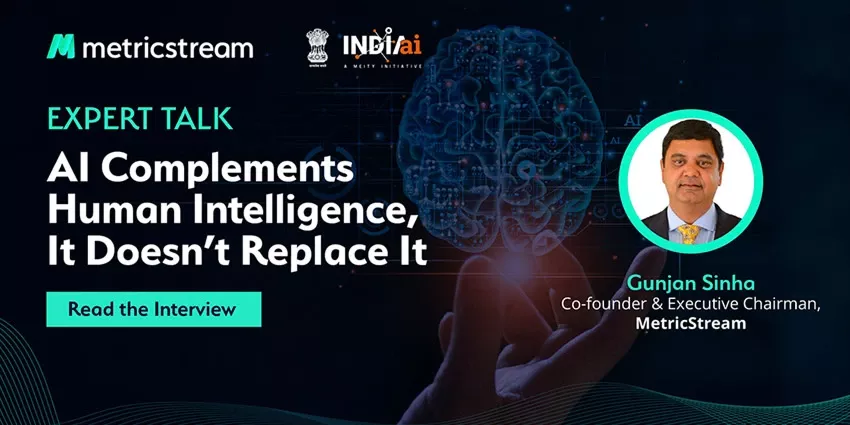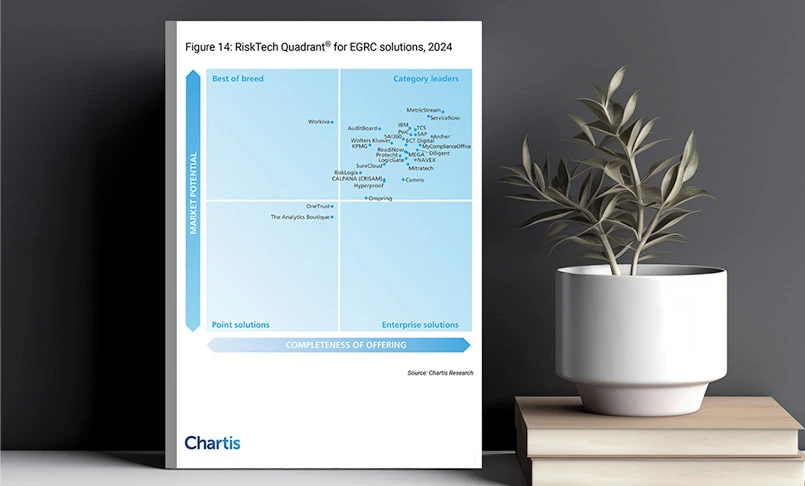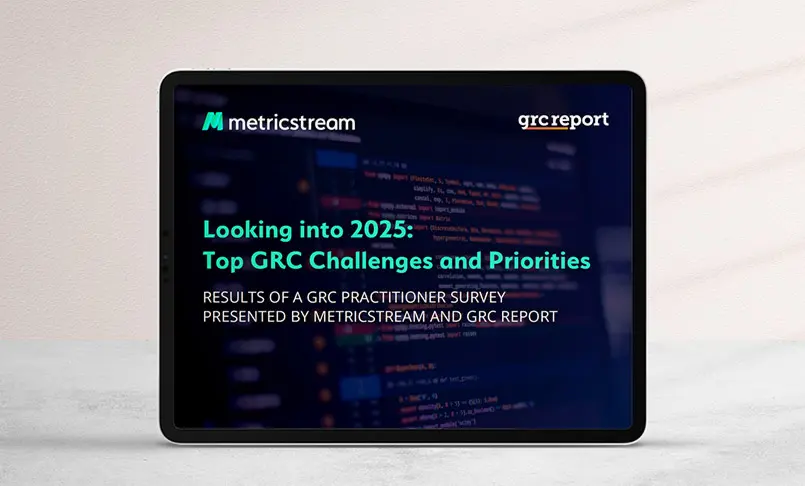AI Complements Human Intelligence, It Doesn’t Replace It
- GRC
- 30 October 24

Introduction
In the latest edition of Expert Talk on the INDIAai portal, MetricStream’s Co-Founder and Executive Chairman, Gunjan Sinha, was interviewed by Dr. Nivash Jeevanandam, a Senior Technology Journalist and Research Writer. Read the interview below for Gunjan’s perspective on artificial intelligence, the key role it plays in innovation, its use in Governance, Risk, and Compliance (GRC) and more.
*This interview was initially published in the INDIAai website, click here to read the original article.
Gunjan Sinha is the founder and executive chairman of MetricStream. He is best known as the founder of WhoWhere? - an internet search engine he sold to Lycos in 1998. He is also the co-founder and board member of the customer engagement software company eGain (NASDAQ: EGAN).
From 2010 to 2017, Gunjan was a founding board member of the US India Endowment Board, founded by the US State Department and the White House Office of Science and Technology. This board supports science and technology innovation and commercialization for social good in the US and India.
Gunjan helped create Child Family Health International, a United Nations-recognized public non-profit, to transform global health education. He is passionate about social innovation, diversity, inclusiveness, and global risk management.
INDIAai interviewed Gunjan Sinha to get his perspective on AI.
As an entrepreneur, how do you see AI shaping the future of innovation and entrepreneurship? What emerging AI trends excite you the most?
AI complements human intelligence: it doesn’t replace it, resulting in AI becoming the most significant transformative force of our times. Process automation, enhanced decision-making, and personalized customer experiences result in unprecedented efficiency, precision, and adaptability, a game-changer. AI is democratizing access to tools and knowledge, creating a level playing field for enterprises of all sizes.
In the increasingly interconnected risk landscape, I see AI revolutionizing risk management. AI-powered workflows today can predict risks, automate control testing, and provide real-time insights. It enables organizations to leverage risk as a driver for growth, transforming traditional business models in the process.
With your experience at MetricStream, how do you see AI revolutionizing traditional business models, particularly in customer engagement, governance, and risk management?
The possibilities with AI are endless. AI-powered tools can analyze vast amounts of data for usage patterns, often in real-time. These use cases directly benefit agile, responsive, and cost-effective business operations. AI-infused workflows at MetricStream, for instance, have allowed organizations to significantly reduce control testing costs and improve issue management speed by grouping similar issues and suggesting tailored action plans.
Likewise, analyzing usage patterns allows for hyper-personalization of customer journeys, leading to stronger relationships and more engaging experiences.
How do AI advancements enhance the predictive capabilities of Governance, Risk, and Compliance (GRC) platforms, helping businesses anticipate and mitigate risks?
AI today allows for connecting data from diverse sources, such as regulatory updates, cybersecurity reports, and third-party risk assessments, for creating a holistic view of the organization’s risk profile in real-time. Vast and complex datasets are processed with AI technologies like machine learning, NLP, and LLMs to identify emerging risks and vulnerabilities.
Likewise, AI's ability to analyze large datasets enables enterprises to identify unseen risks that would not have been possible manually.
Examples:
- Third-party risk analysts get to act on recommendations from AI risk assessments.
- Automatic recommendations of risk assessment plans and risk treatment.
- Quick identification of risk management processes and missing controls.
What role does AI play in enhancing regulatory compliance and risk management in banking, energy, and healthcare industries? How can AI improve governance processes to be more resilient and adaptive to change?
AI enables continuous monitoring of banking transactions or healthcare operations to identify anomalies or potential non-compliance issues. For example, suspicious activities like money laundering in banking or non-adherence to privacy regulations like HIPAA in healthcare can be automated. Compliance and risk management examples: AI can automate policy searches, map regulatory changes to existing controls, and predict risk scenarios. AI solutions can help financial institutions complete third-party assessments significantly faster, allowing risk teams to focus more on mitigation efforts rather than documentation reviews.
Likewise, governance enhancements would include data-driven decision-making, governance process automation and adaptive governance models that can continuously learn from evolving risks and regulatory updates.
As AI increasingly detects and manages risks, what are the most critical considerations for companies to ensure responsible AI usage within their GRC frameworks?
With increasing AI integration, it is crucial to establish guardrails that ensure AI's safe, ethical, and secure use, particularly in sensitive sectors like banking, energy, and healthcare. Establish an AI governance framework that aligns with legal and ethical standards, conduct comprehensive risk assessments, and promote transparency and explainability of AI models so that AI can trace and audit decisions.
Likewise, human-in-the-loop processes are vital to validating AI-driven decisions and safeguarding against overreliance in high-risk areas such as patient care. Employees must be aware of responsible AI use and create cross-functional ethics committees to oversee AI initiatives, ensuring that AI applications are compliant, ethical, and secure from biases and vulnerabilities.
How do you see AI contributing to global social good, especially in areas like public health, education, and financial inclusion?
AI can optimize healthcare delivery, predict disease outbreaks, and improve access to medical services through telemedicine, automated diagnostics, and personalized healthcare. AI can personalize learning experiences, making education more accessible and tailored to individual needs. Financial inclusion can be improved through AI-powered credit scoring models that offer financial services to underbanked populations.
Given your deep experience in global risk management, how can AI tools help businesses better navigate emerging risks such as cybersecurity threats, data privacy concerns, and geopolitical challenges?
In cyber risk management, AI is a protective layer with real-time threat detection, automated incident response, and predictive threat modelling. It can detect anomalies and potential breaches faster than traditional methods, helping organizations respond swiftly to threats. For example, AI can analyze patterns in email communication and detect subtle signs of phishing attempts that may not be obvious to the human eye. Automated continuous control monitoring for cloud instances enables continuous assessment of cloud configurations and applications against regulatory standards and security best practices.
Likewise, AI can be used in risk forecasting to anticipate and plan for disruptions like supply chain interruptions, sanctions, or regulatory changes, as well as for scenario planning to simulate geopolitical scenarios to understand their impact on business operations and plan resilient strategies.
What advice would you give future leaders about integrating AI into their strategic decision-making processes?
Embrace AI as a strategic asset that can drive innovation, enhance decision-making, and provide a competitive edge. Focus on responsible AI usage and investing in AI governance frameworks. AI decisions should be transparent, ethical, and aligned with organizational goals.
Discover how MetricStream ConnectedGRC integrates AI to enhance GRC solutions. Request a personalized demo now.







